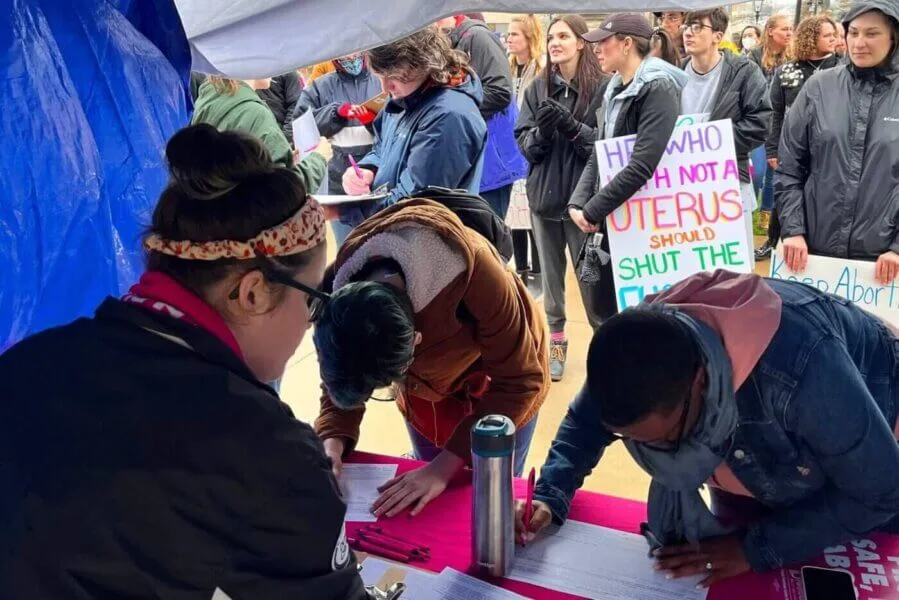
Planned Parenthood Advocates of Michigan collect signatures for the "Reproductive Freedom for All" ballot initiative at a protest after the draft Supreme Court opinion was leaked. (Source: PPAM Facebook)
MICHIGAN–The “Reproductive Freedom for All” petition has broken new ground in Michigan, collecting the most signatures of any ballot initiative in the state’s history, according to Linh Song, co-chair of the group behind the petition. Here’s what you should know about this news.
How many signatures? Nearly 800,000 Michiganders have signed the reproductive rights petition in the past 180 days – almost twice the 425,059 needed to get the proposal on this year’s November ballot. This is the most signatures a Michigan initiative has ever received.
The ‘Gander could not independently verify the number of signatures on the Reproductive Freedom for All petition, but reached out to Sommer Foster, co-director of Michigan Voices – which is one of the groups involved with the petition. She said they would not confirm the exact number of signatures until they’re submitted to the Secretary of State’s office for verification on July 11. See Foster’s direct quote below.
What’s the petition about? People who signed the Reproductive Freedom for All petition were essentially saying they supported putting the “Michigan Right to Reproductive Freedom Initiative” on their ballots this fall – not that they supported abortion, but that they support the initiative being put to a vote by Michiganders in the Nov. 8 election.
What would the initiative do? If the “Michigan Right to Reproductive Freedom Initiative” passes, an amendment would be added to the state constitution guaranteeing a right to reproductive freedom in Michigan. Important notes about this amendment:
- In it, “reproductive freedom” is defined as “the right to make and effectuate decisions about all matters relating to pregnancy, including but not limited to prenatal care, childbirth, postpartum care, contraception, sterilization, abortion care, miscarriage management, and infertility care.”
- The state would still be able to regulate abortion after fetal viability, but
- The state could not ban the use of abortion to protect the life or physical or mental health of the pregnant individual.
- An attending healthcare professional would decide if the use of abortion meets those qualifications.
What does this mean for voters? First, the signatures must be delivered to the Secretary of State by July 11. Then, the Bureau of Elections must verify the signatures. Next, the Board of State Canvassers must vote to verify the signatures. Once they do, the initiative goes onto the 2022 general election ballot, where voters will see the proposed amendment under the name “Michigan Right to Reproductive Freedom Initiative.”
What will happen if it passes? If a majority of voters choose “yes” on the initiative in November, the amendment will be added to the state’s constitution and go into effect 45 days after its approval. Once in the constitution, it could not be amended without going through another vote of the people – effectively protecting reproductive freedom from any attempts a legislature might make to strip Michiganders of abortion rights in the future.
Given poll data of Michiganders, it is likely the initiative would receive a majority vote.
In a January 2022 WDIV/Detroit News poll, 67% of Michiganders supported Roe and more than 77% believed abortion should be a woman’s decision. In an April Courier Newsroom/Data for Progress poll, only 28% of respondents said the government should be able to make decisions on reproductive rights.
In context: “The Supreme Court will not determine our future – Michigan voters will,” said Ashlea Phenicie, director of communications at Planned Parenthood Advocates of Michigan, to PBS NewsHour. This is a direct reference to the US Supreme Court’s June 24 decision overturning Roe v. Wade, which eliminated the constitutional right to an abortion.
Side note: For further context, another initiative that collected twice the required amount was the Bottle Bill of 1976, which added a ten-cent deposit on bottles and cans. That initiative needed 212,000 signatures, and it collected more than 400,000.
Sommer Foster’s full quote, as referenced above: “We’ve seen an unprecedented outpouring of support for Reproductive Freedom for All since the leaked opinion overturning Roe v. Wade, and the ultimate ruling by the Supreme Court only confirmed that we can’t wait any longer to secure our rights in Michigan. The momentum for this ballot measure and the strength of our statewide network of volunteers is only growing. We continue to be laser focused on collecting as many valid signatures as possible to qualify for the Nov. 8 ballot and will share the official number we turn into the Michigan Secretary of State once we complete our rigorous verification process on July 11.”

VIDEO: Trump isn’t the only republican facing charges for alleged financial crimes
https://www.tiktok.com/@gandernewsroom/video/7361494909938978090 A whole lot of Michigan Republicans and lobbyists are facing criminal charges for...

VIDEO: It’s expensive to be poor in Michigan
https://www.tiktok.com/@gandernewsroom/video/7361154790300060974 Ever heard of predatory payday loans? Here’s how new laws could help protect...

Here’s everything you need to know about this month’s Mercury retrograde
Does everything in your life feel a little more chaotic than usual? Or do you feel like misunderstandings are cropping up more frequently than they...

The ’Gander wins multiple 2023 Michigan Press Association awards
MICHIGAN—The ’Gander Newsroom has earned multiple awards in the 2023 Michigan Press Association Better Newspaper Contest. The awards were announced...

Michigan Republicans ask Supreme Court to restrict medication abortion access
A lawsuit supported by Republicans could disrupt access to the most common form of abortion—even in Michigan, where reproductive rights are...






